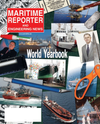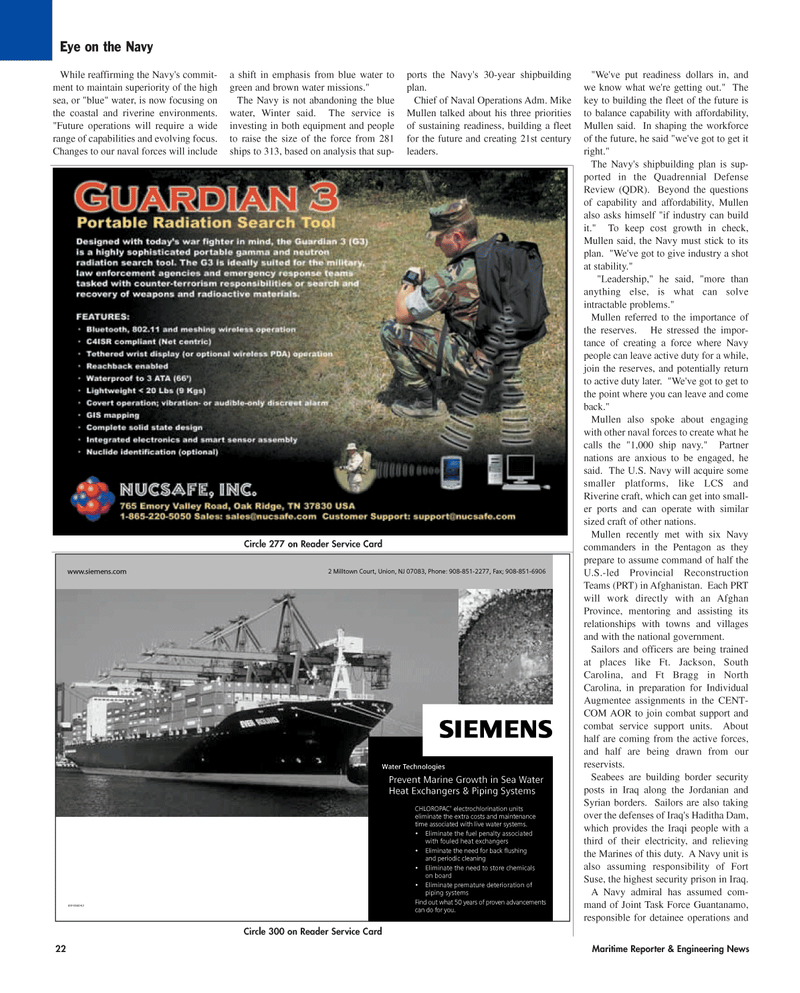
Page 22: of Maritime Reporter Magazine (June 2006)
Annual World Yearbook
Read this page in Pdf, Flash or Html5 edition of June 2006 Maritime Reporter Magazine
While reaffirming the Navy's commit- ment to maintain superiority of the high sea, or "blue" water, is now focusing on the coastal and riverine environments. "Future operations will require a wide range of capabilities and evolving focus.
Changes to our naval forces will include a shift in emphasis from blue water to green and brown water missions."
The Navy is not abandoning the blue water, Winter said. The service is investing in both equipment and people to raise the size of the force from 281 ships to 313, based on analysis that sup- ports the Navy's 30-year shipbuilding plan.
Chief of Naval Operations Adm. Mike
Mullen talked about his three priorities of sustaining readiness, building a fleet for the future and creating 21st century leaders. "We've put readiness dollars in, and we know what we're getting out." The key to building the fleet of the future is to balance capability with affordability,
Mullen said. In shaping the workforce of the future, he said "we've got to get it right."
The Navy's shipbuilding plan is sup- ported in the Quadrennial Defense
Review (QDR). Beyond the questions of capability and affordability, Mullen also asks himself "if industry can build it." To keep cost growth in check,
Mullen said, the Navy must stick to its plan. "We've got to give industry a shot at stability." "Leadership," he said, "more than anything else, is what can solve intractable problems."
Mullen referred to the importance of the reserves. He stressed the impor- tance of creating a force where Navy people can leave active duty for a while, join the reserves, and potentially return to active duty later. "We've got to get to the point where you can leave and come back."
Mullen also spoke about engaging with other naval forces to create what he calls the "1,000 ship navy." Partner nations are anxious to be engaged, he said. The U.S. Navy will acquire some smaller platforms, like LCS and
Riverine craft, which can get into small- er ports and can operate with similar sized craft of other nations.
Mullen recently met with six Navy commanders in the Pentagon as they prepare to assume command of half the
U.S.-led Provincial Reconstruction
Teams (PRT) in Afghanistan. Each PRT will work directly with an Afghan
Province, mentoring and assisting its relationships with towns and villages and with the national government.
Sailors and officers are being trained at places like Ft. Jackson, South
Carolina, and Ft Bragg in North
Carolina, in preparation for Individual
Augmentee assignments in the CENT-
COM AOR to join combat support and combat service support units. About half are coming from the active forces, and half are being drawn from our reservists.
Seabees are building border security posts in Iraq along the Jordanian and
Syrian borders. Sailors are also taking over the defenses of Iraq's Haditha Dam, which provides the Iraqi people with a third of their electricity, and relieving the Marines of this duty. A Navy unit is also assuming responsibility of Fort
Suse, the highest security prison in Iraq.
A Navy admiral has assumed com- mand of Joint Task Force Guantanamo, responsible for detainee operations and
Water Technologies www.siemens.com 2 Milltown Court, Union, NJ 07083, Phone: 908-851-2277, Fax; 908-851-6906
USF-0040-R3
CHLOROPAC ® electrochlorination units eliminate the extra costs and maintenance time associated with live water systems. • Eliminate the fuel penalty associated with fouled heat exchangers • Eliminate the need for back flushing and periodic cleaning • Eliminate the need to store chemicals on board • Eliminate premature deterioration of piping systems
Find out what 50 years of proven advancements can do for you.
Prevent Marine Growth in Sea Water
Heat Exchangers & Piping Systems
Circle 300 on Reader Service Card
Circle 277 on Reader Service Card 22 Maritime Reporter & Engineering News
Eye on the Navy
MR JUNE2006 #3 (17-24).qxd 6/2/2006 3:33 PM Page 22

 21
21

 23
23
